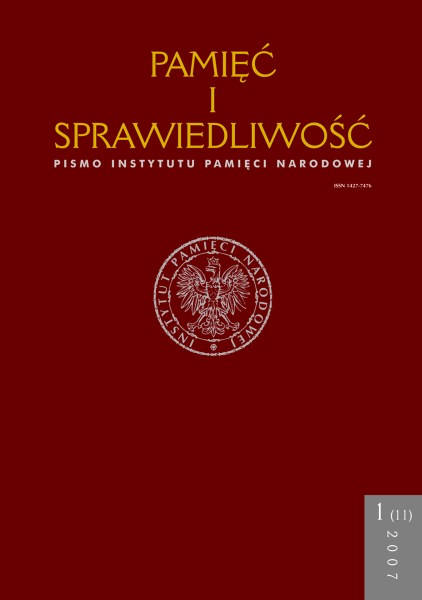Udział organów bezpieczeństwa w akcji rekrutacji na studia w województwie lubelskim w latach 1947–1956
Pamięć i Sprawiedliwość, Vol. 11 No 1 (2007), pages: 193-226
Publication date: 2007-12-30
Résumé
Engagement in university enrolment was one of the elements of security apparatus activities within so called ideological offensive among the youth, which was led by party and state authorities. UB played an important role in changing the social origin of students. Information about students provided by UB officers were one of the main premises in allowing such a person for matriculation. Thanks to close cooperation with members of enrolment commissions, especially with so called “social factor”, UB officers had an impact on the examination results of “unwanted” people, who, despite they might have got positive marks, were not
accepted, for example under the pretext of lack of vacancies.
Participation in selecting students-to-be was at the same time a perfect tool to “discipline” all the youth and even their families. Such activities included also a specially understood “protection” of academic environments, that is expelling “undesirable” people and providing for places for people “with the proper class origin”.
Judging on accessible UB documents it is not possible to decide what number of students got negative response. According to the data of Lublin Provincial Office of Public Security from 1948, 18% of people who applied for Maria Curie-Skłodowska University were deprived of the possibility to study.
The security authorities admitted that verifi cation of candidates made by UB brought some planned results. It did not mean though that the sieve was dense enough. There were cases when “undesirable” from the point of view of party and state authorities people would begin their academic studies. That is why security
organs with local party committees and university authorities tried to lead “prophylactic actions”, that is to expel the given students. Nevertheless, party and state authorities, and thus security organs were avoiding making the number of young Poles with “negative” marks too high.
Articles les plus lus par le même auteur ou la même autrice
- Jacek Wołoszyn, Dieter Pohl, Bogdan Musiał, [Recenzja] Dieter Pohl, Von der „Judenpolitik” zum Judenmord. Der Distrikt Lublin des Generalgouvernements 1939–1944, Verlag Peter Lang GmbH, Frankfurt am Main–Berlin–Bern–New York-Paris–Wien 1993, ss. 208 i Bogdan Musial, Deutsche Zivilverwaltung und Judenverfolgung im Generalgouvernement. Eine Fallstudie zum Distrikt Lublin 1939–1944, Verlag Harrassowitz, Wiesbaden 1999, ss. 435 , Pamięć i Sprawiedliwość: Vol. 6 No 2 (2004)
- Jacek Wołoszyn, Konspiracja młodzieżowa na ziemiach polskich w latach 1944–1956 , Pamięć i Sprawiedliwość: Vol. 17 No 1 (2011)
- Jacek Wołoszyn, Propagandowa rola procesów członków konspiracyjnych organizacji młodzieżowych w latach 1948–1956 , Pamięć i Sprawiedliwość: Vol. 43 No 1 (2024)
- Jacek Wołoszyn, Reakcja prasy konspiracyjnej na wydarzenia w Zamojskiem z lat 1942–1943 , Pamięć i Sprawiedliwość: Vol. 2 No 2 (2002)
- Jacek Wołoszyn, Współpraca Związku Młodzieży Polskiej z UB w realizacji planów „ofensywy ideologicznej” w środowiskach młodzieżowych w województwie lubelskim , Pamięć i Sprawiedliwość: Vol. 12 No 1 (2008)
- Jacek Wołoszyn, „Ostra broń” – agentura celna. Tajni współpracownicy w więzieniach i aresztach śledczych w latach 1944–1956 , Pamięć i Sprawiedliwość: Vol. 16 No 2 (2010)
- Jacek Wołoszyn, Członkowie Związku Młodzieży Polskiej w województwie lubelskim wobec Kościoła katolickiego – przyczynek do dziejów mentalności młodzieży , Pamięć i Sprawiedliwość: Vol. 7 No 1 (2005)
 Język Polski
Język Polski
 English
English
 Deutsch
Deutsch
 Français (France)
Français (France)
 Italiano
Italiano
 Русский
Русский


 PDF (Język Polski)
PDF (Język Polski)
